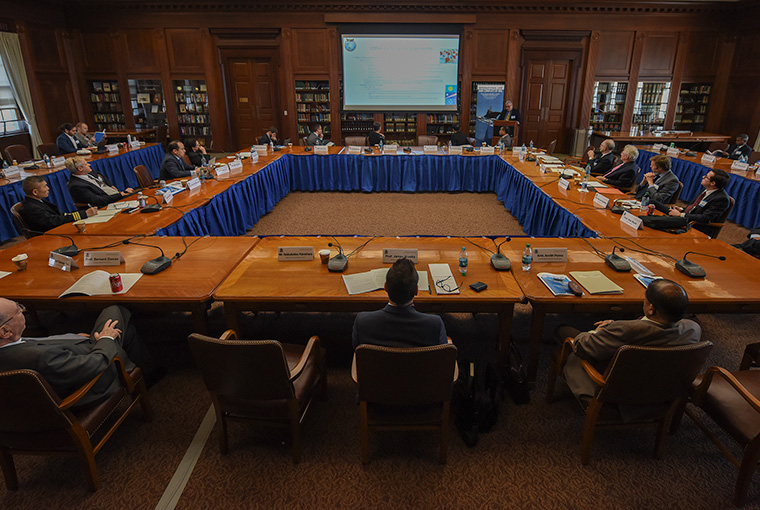Stockton Center conference explores how nations can use international law to address rising challenges at sea

NEWPORT, R.I. -- More than 45 legal scholars gathered at the U.S. Naval War College from Nov. 27-28 for a conference held by the Stockton Center for International Law on the law and conflict at sea.
The Alexander C. Cushing International Law Conference examined topics ranging from conflict scenarios in the East China Sea and Southeast Asia to the status of unmanned systems at sea.
“This conference brings together the foremost legal scholars,” said Rear Adm. Jeffrey Harley, U.S. Naval War College president, in the opening session. “The participants have been carefully selected from around the globe, and you all bring a wealth of professional experience and scholarly achievement for which we are grateful.”
The goal was to explore how nations can manage the challenges presented by the changing geopolitics of oceans and their resources, said James Kraska, Stockton Center chairman and a professor of maritime law.
“The United States and its partners around the world are facing challenges arising at sea -- principally from the major powers of China and Russia, but also lesser powers such as Iran and North Korea,” Kraska said.
“These conflicts are political, military and legal -- they have all of these dimensions and elements,” he said. “So we are working both at the strategic level and at the tactical level on how states of good intention that are governed by the rule of law can address and manage these threats.”
Top Japanese officials participated, including Nobukatsu Kanehara, deputy secretary-general of Japan’s National Security Secretariat.
"Japan upholds free and open Indo-Pacific visions which aim to establish a liberal international order in Asia from the Indian Ocean to the Pacific Ocean with respect of the rule of law," Kanehara said.
"The Cushing conference allows us to confirm its importance with American friends, and friends from other parts of the world.”
The Japan Maritime Self Defense Force Command and Staff College was a co-sponsor of the conference.
“It is helpful to exchange opinions not just with U.S. military representatives, but also European nations and Southeast Asian countries,” said Capt. Toshinari Matsuo, a member of the operational law office of the Japanese Command and Staff College.
“We do not have such opportunities often, so this is really a precious opportunity.”
Another co-sponsor was the Fletcher School of Law and Diplomacy at Tufts University.
“The Fletcher School is committed to studying international law not as an abstract subject but one which is deeply influenced by, and in turn influences, issues of national security, economics and the environment,” said John Burgess, executive director of the Fletcher School’s LLM program, who attended the conference.
Attendees came from a dozen countries, including Australia, England, Germany, India, Israel, Italy, Japan, the Netherlands, the Philippines, South Korea, Sri Lanka and Vietnam.
Papers produced in conjunction with the conference will be published in a future volume of “International Law Studies,” the law journal of the Naval War College and the oldest journal of international law in the United States.
Keynote speaker Bernard Oxman, University of Miami law professor and director of the school’s maritime law master’s program, noted that increasing claims on the world’s oceans will continue to test the limits of international law.
“It is said that eternal vigilance is the price of liberty,” Oxman said. “That may be as true on sea as it is on land.”
About the Stockton Center: Named for Charles H. Stockton, a former Naval War College president and author of the first code of the law of naval warfare, the Stockton Center is the world's premier research institute for national security and international law.
The faculty of the Stockton Center includes members from all U.S. military branches as well as foreign military officers from the United Kingdom and Japan.
The center produces cutting-edge legal research, writing and analysis regarding current issues of public international law, oceans law and maritime security to inform and advise military and leaders at all levels of the U.S. government.
